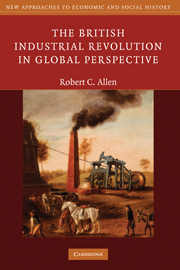Book contents
- Frontmatter
- Contents
- List of plates
- List of figures
- List of tables
- Acknowledgments
- 1 The Industrial Revolution and the pre-industrial economy
- Part I The pre-industrial economy
- Part II The Industrial Revolution
- 6 Why was the Industrial Revolution British?
- 7 The steam engine
- 8 Cotton
- 9 Coke smelting
- 10 Inventors, Enlightenment and human capital
- 11 From Industrial Revolution to modern economic growth
- References
- Index
9 - Coke smelting
Published online by Cambridge University Press: 05 June 2014
- Frontmatter
- Contents
- List of plates
- List of figures
- List of tables
- Acknowledgments
- 1 The Industrial Revolution and the pre-industrial economy
- Part I The pre-industrial economy
- Part II The Industrial Revolution
- 6 Why was the Industrial Revolution British?
- 7 The steam engine
- 8 Cotton
- 9 Coke smelting
- 10 Inventors, Enlightenment and human capital
- 11 From Industrial Revolution to modern economic growth
- References
- Index
Summary
About 26 years ago my Husband conceived this happy thought – that it might be possible to make bar iron from pit coal pigs … Edward Knight Esq. a capitol Iron Master urged my Husband to get a patent, that he might reap the benefit for years of this happy discovery: but he said he would not deprive the public of Such an Acquisition which he was Satisfyed it would be; and so it has proved, for it soon spread and many Furnaces both in this Neighbourhood and Several other places have been erected for this purpose.
Abiah Darby, widow of Abraham Darby II, 1775Coke smelting is one of the famous inventions of the Industrial Revolution and had an enormous long-run impact, for it was essential for the production of cheap iron, which, in turn, was required for the railroad, steamships and the mechanization of industry. Abraham Darby's success in 1709 was a macro-invention that radically changed factor proportions as coke displaced charcoal in the blast furnace. The macro-invention was followed by a century and a half of improvements in which productivity rose substantially. Technical change was far more neutral than the original invention: between 1709 and 1850, all of the inputs were saved with the greatest economies occurring in coal and labour. Many of these advances were due to local learning.
- Type
- Chapter
- Information
- The British Industrial Revolution in Global Perspective , pp. 217 - 237Publisher: Cambridge University PressPrint publication year: 2009

